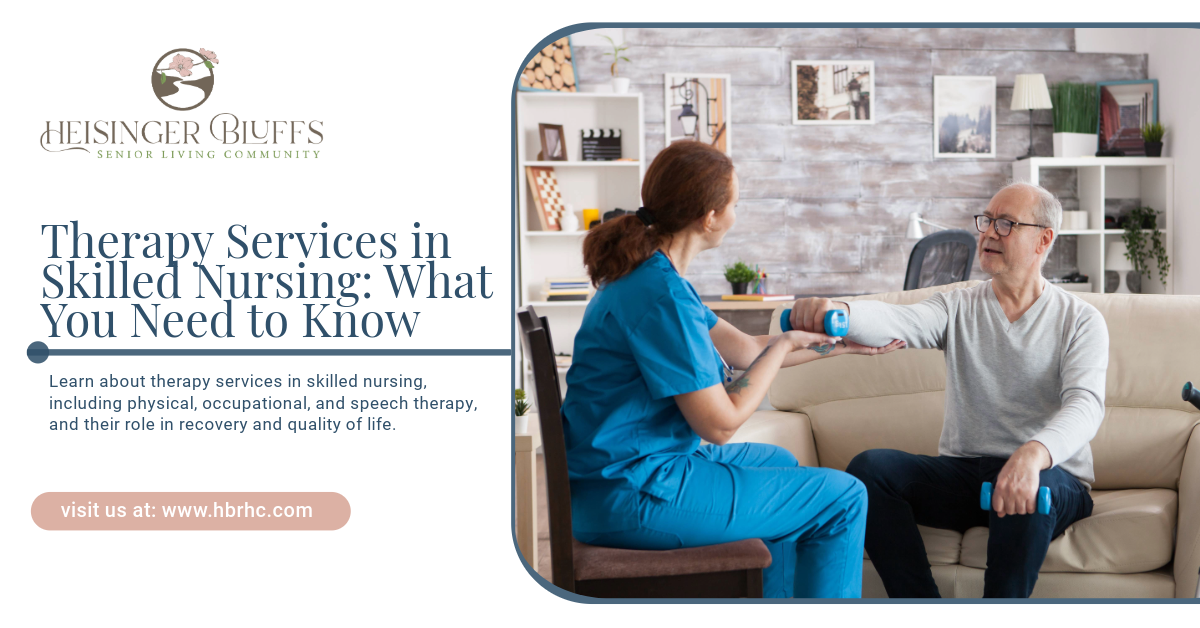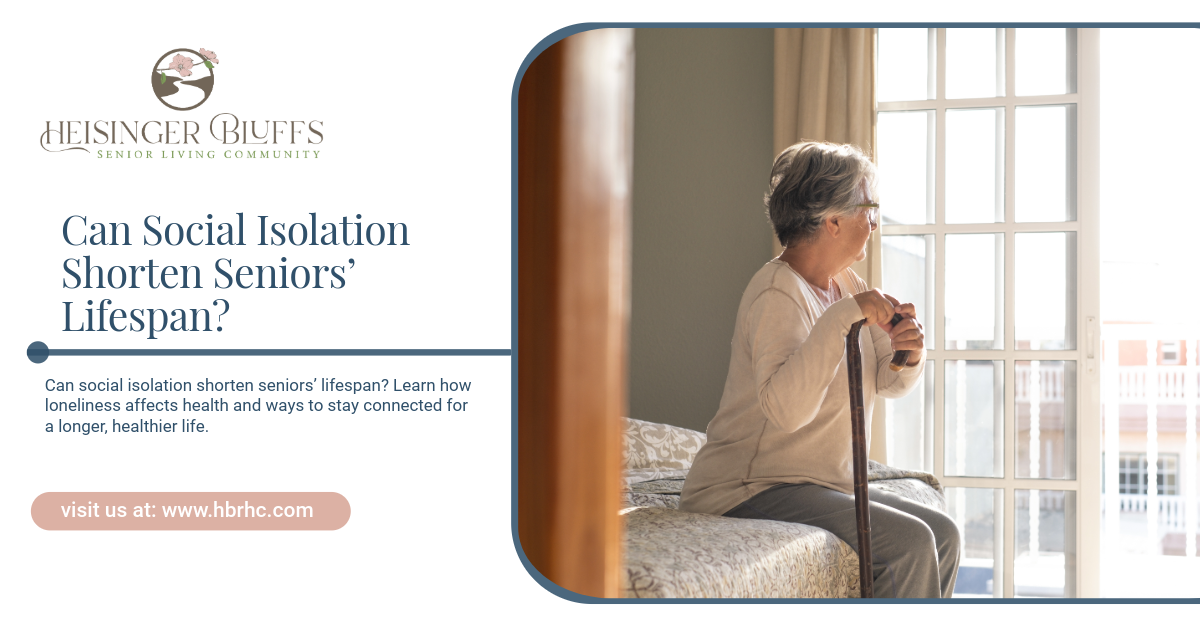Therapy Services in Skilled Nursing: What You Need to Know

As we age, our bodies and minds may face challenges that require professional care and rehabilitation. Skilled nursing facilities (SNFs) are equipped to provide comprehensive care for seniors who need assistance with daily activities, medical treatments, and rehabilitation services. Therapy services, including physical therapy (PT), occupational therapy (OT), and speech therapy (ST), are essential components of skilled nursing care, designed to help seniors regain independence, improve their quality of life, and manage chronic conditions or recover from illness, surgery, or injury.
In this blog post, we’ll explore the different types of therapy services offered in skilled nursing facilities, their benefits, and how they play a pivotal role in the rehabilitation and well-being of seniors. We will also discuss what families should know when considering therapy services for their loved ones.
What is Skilled Nursing?
Skilled nursing is a level of care provided in specialized settings, such as skilled nursing facilities, hospitals, or in-home care. It refers to medical care and rehabilitation services provided by licensed healthcare professionals, including nurses, therapists, and physicians. Skilled nursing care is typically recommended for individuals who have experienced a significant medical event, such as surgery, stroke, or severe injury, or for those who require ongoing care for chronic conditions like arthritis, dementia, or Parkinson’s disease.
Within a skilled nursing facility, therapy services are often a central part of a resident's care plan. These services are tailored to meet each resident’s unique needs, helping them recover from illness, surgery, or injury and regain or maintain their ability to live independently.
The Importance of Therapy Services in Skilled Nursing
Therapy services in skilled nursing facilities are not only essential for physical recovery but also for enhancing a senior's overall quality of life. These services are aimed at restoring function, preventing further complications, and promoting independence. They can help seniors regain the ability to perform daily tasks, reduce pain, and improve mobility and communication skills.
Some of the main benefits of therapy services include:
- Restoring Physical Function: Many seniors experience a decline in physical function due to aging, illness, or injury. Therapy services aim to restore strength, mobility, and flexibility, enabling seniors to regain independence in daily activities.
- Reducing Pain and Discomfort: Whether recovering from surgery or managing chronic conditions like arthritis, therapy services can help reduce pain through exercises, stretches, and other interventions, making it easier for seniors to move and engage in daily activities.
- Improving Communication and Cognitive Function: Speech therapy helps seniors with communication difficulties, whether due to stroke, dementia, or other conditions. Additionally, cognitive therapy can help seniors improve memory, focus, and problem-solving skills.
- Promoting Emotional Well-Being: Physical limitations can have a significant impact on a senior’s mental and emotional health. By improving mobility and self-sufficiency, therapy services help boost self-esteem, reduce depression, and enhance overall well-being.
Types of Therapy Services in Skilled Nursing
Therapy services in skilled nursing facilities are typically divided into three primary categories: physical therapy, occupational therapy, and speech therapy. Each type of therapy targets different aspects of health and function, and together, they provide a holistic approach to recovery and rehabilitation.
1. Physical Therapy (PT)
Physical therapy focuses on improving a senior's ability to move, walk, and perform other physical activities. PT is often used after surgery, illness, or injury to help patients regain strength, mobility, and flexibility. It involves exercises, stretches, and manual techniques aimed at improving balance, coordination, and overall physical function.
Some of the key goals of physical therapy include:
- Regaining strength and mobility after surgery, injury, or illness
- Improving balance and coordination to prevent falls
- Reducing pain and inflammation through targeted exercises and modalities (e.g., heat or cold therapy)
- Improving flexibility and range of motion in joints and muscles
Physical therapists also educate patients on proper body mechanics and posture to reduce the risk of injury in the future.
2. Occupational Therapy (OT)
Occupational therapy helps seniors improve their ability to perform daily activities or "occupations," such as bathing, dressing, cooking, and cleaning. The goal of OT is to enhance independence by teaching patients adaptive techniques and providing assistive devices, when necessary. OT is beneficial for seniors who have experienced cognitive or physical impairments that affect their daily functioning.
Some of the primary objectives of occupational therapy include:
- Improving fine motor skills for tasks such as writing, buttoning clothes, or using utensils
- Enhancing independence in daily living activities like grooming, dressing, and meal preparation
- Teaching strategies for adapting the home environment to accommodate physical limitations
- Addressing cognitive challenges, such as memory loss or difficulty concentrating
OT helps seniors regain confidence and independence in their daily lives, improving their quality of life and mental well-being.
3. Speech Therapy (ST)
Speech therapy is designed to help seniors with communication and swallowing difficulties. Seniors may experience speech and language issues due to age-related conditions, strokes, dementia, or other neurological disorders. Speech therapists work with individuals to improve their ability to communicate clearly, understand language, and swallow safely.
Key areas of speech therapy include:
- Improving communication skills for seniors who have difficulty speaking, understanding, or using language
- Addressing swallowing difficulties (dysphagia), which can lead to choking or malnutrition
- Helping with cognitive-communication issues, such as memory and attention problems
- Rehabilitating speech post-stroke or after other neurological events
By improving communication and swallowing abilities, speech therapy helps seniors regain a sense of normalcy and independence.
How Therapy Services Benefit Seniors in Skilled Nursing
Therapy services play a vital role in the rehabilitation and well-being of seniors in skilled nursing facilities. These services are tailored to meet the specific needs of each resident and support their recovery, comfort, and overall quality of life.
1. Enhanced Independence
One of the primary goals of therapy services is to help seniors regain their independence. Whether it's regaining the ability to walk after a hip replacement or learning adaptive techniques for daily activities, therapy services empower seniors to take care of themselves and improve their self-sufficiency.
2. Improved Quality of Life
Through therapy, seniors can experience significant improvements in their physical, cognitive, and emotional health. The ability to move more freely, communicate more effectively, and engage in daily activities independently can greatly enhance a senior’s overall quality of life.
3. Faster Recovery from Illness or Surgery
Therapy services are essential for seniors recovering from surgery, injury, or illness. By providing targeted rehabilitation exercises and techniques, therapy helps accelerate recovery and minimizes the risk of complications. Seniors can regain mobility, strength, and function more quickly with the help of professional therapists.
4. Pain Management and Comfort
Chronic pain, whether from arthritis, injuries, or surgery, is common among seniors. Therapy services can help manage pain through targeted exercises, stretches, and modalities like heat or cold therapy. This can significantly improve comfort levels and reduce the need for pain medications, which can have side effects.
5. Increased Socialization and Mental Well-Being
The social interaction provided by therapy sessions can boost a senior’s mental health and reduce feelings of isolation. Group therapy sessions, in particular, provide opportunities for socialization, which is essential for seniors’ emotional well-being.
How to Choose Therapy Services for a Loved One
When considering therapy services for a loved one in a skilled nursing facility, it’s important to keep the following in mind:
- Assessing the Need: Understand the specific needs of your loved one. Do they need help with mobility, daily living activities, or communication? This will determine which type of therapy services are most appropriate.
- Reviewing Qualifications: Ensure that the therapists are licensed and experienced in working with seniors. A skilled nursing facility should have a team of certified physical, occupational, and speech therapists.
- Personalized Care Plans: The best therapy services are those that are customized to your loved one's specific goals. A comprehensive care plan should be developed that addresses both short-term and long-term needs.
- Family Involvement: Therapy is most effective when family members are involved in the process. Therapists often encourage family participation in the therapy sessions to help reinforce skills at home.
Conclusion
Therapy services in skilled nursing facilities are essential for seniors recovering from illness, surgery, or injury, and those needing ongoing support for chronic conditions. Physical therapy, occupational therapy, and speech therapy all play vital roles in improving mobility, daily functioning, communication, and overall well-being. These services help seniors regain independence, reduce pain, and enhance their quality of life.
If you're considering therapy services for a loved one in a skilled nursing facility, be sure to explore the options available and work closely with healthcare professionals to develop a personalized care plan. At Heisinger Bluffs, we are dedicated to providing comprehensive therapy services designed to meet the unique needs of each resident, helping them live their best life with dignity and independence.
Frequently Asked Questions
What types of therapy services are available in skilled nursing facilities?
Skilled nursing facilities typically offer physical therapy, occupational therapy, and speech therapy to help seniors recover from surgery, injury, or illness, and improve their overall well-being.
How do therapy services help seniors with mobility issues?
Physical therapy focuses on improving strength, balance, and coordination, helping seniors regain mobility and independence in activities like walking, standing, and getting in and out of bed.
Can family members be involved in therapy sessions for their loved ones?
Yes, family members are encouraged to participate in therapy sessions. This helps reinforce the skills learned during therapy and ensures that caregivers are equipped to support their loved ones’ recovery at home.
Sources:
- https://www.ncoa.org/older-adults/health/physical-health/chronic-disease/
- https://www.alz.org/alzheimers-dementia/what-is-dementia
- https://my.clevelandclinic.org/health/diseases/8525-parkinsons-disease-an-overview
- https://www.uhhospitals.org/health-information/health-and-wellness-library/article/adult-diseases-and-conditions-v1/occupational-therapy-for-older-adults
- https://www.mayoclinic.org/diseases-conditions/dysphagia/symptoms-causes/syc-20372028











